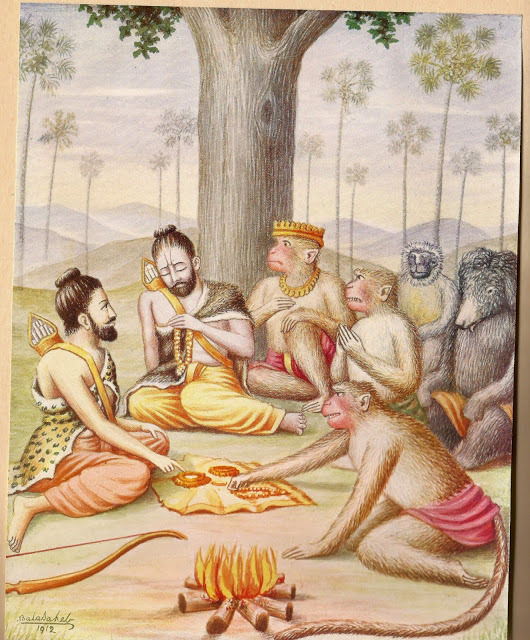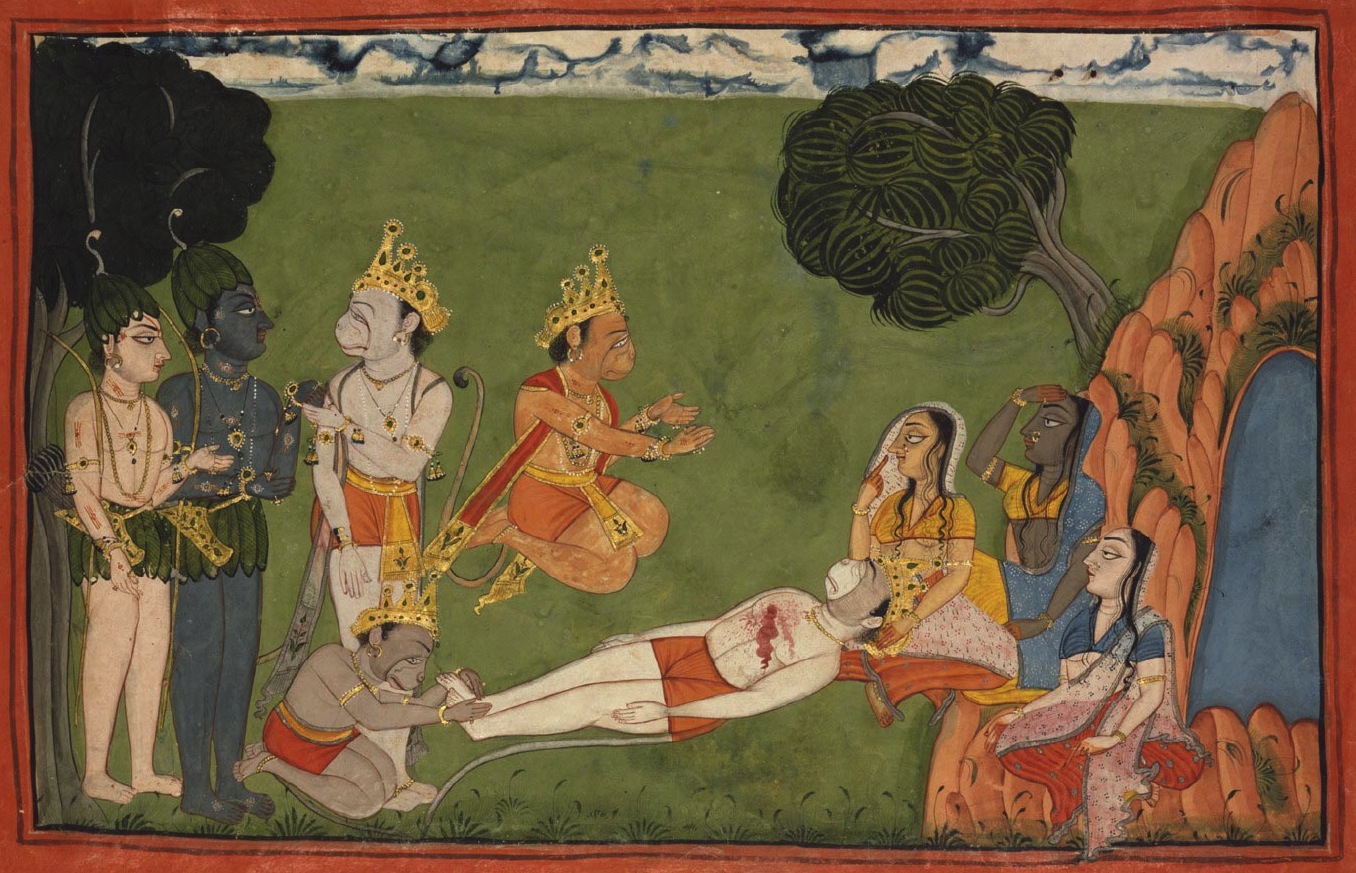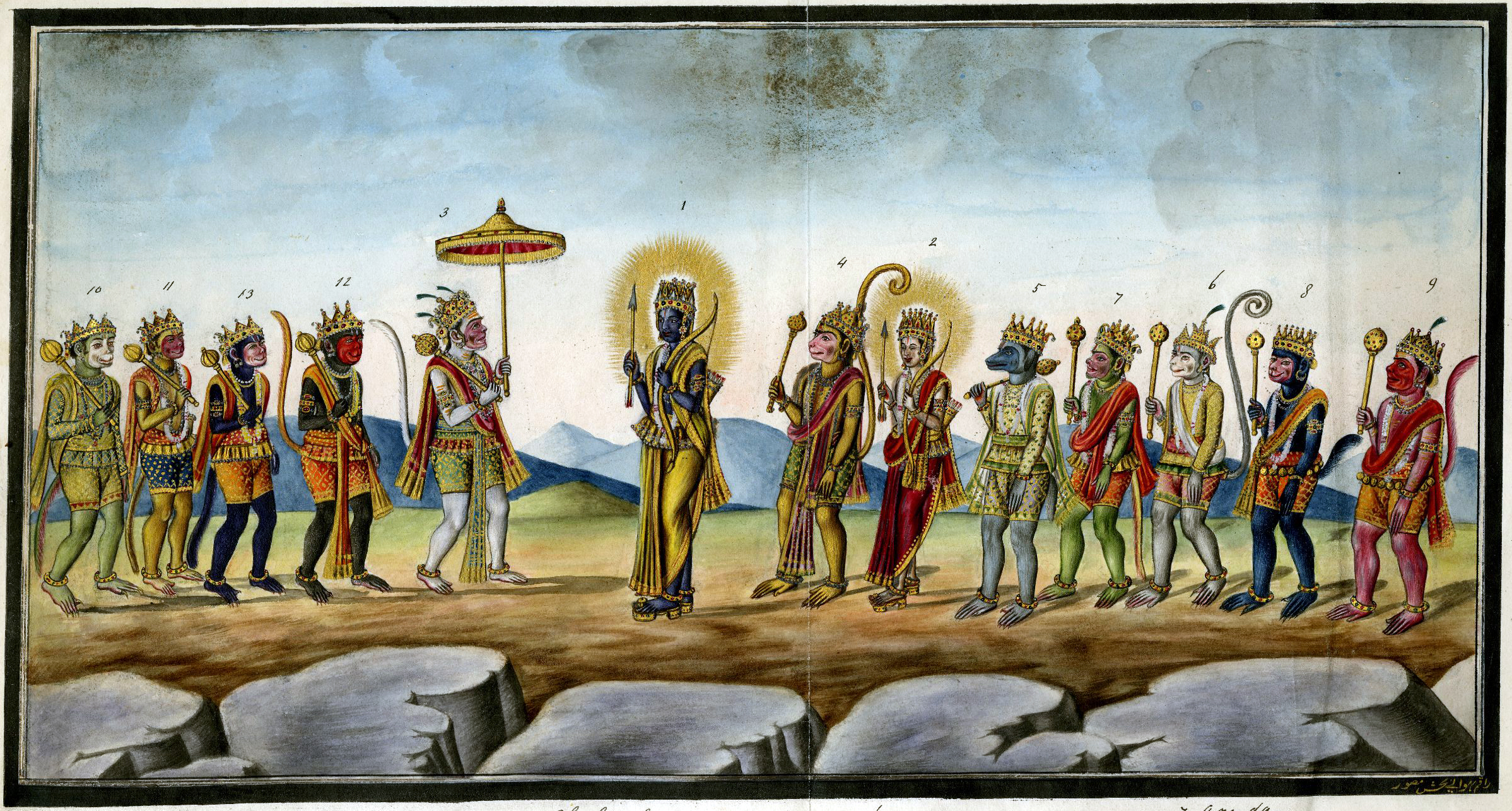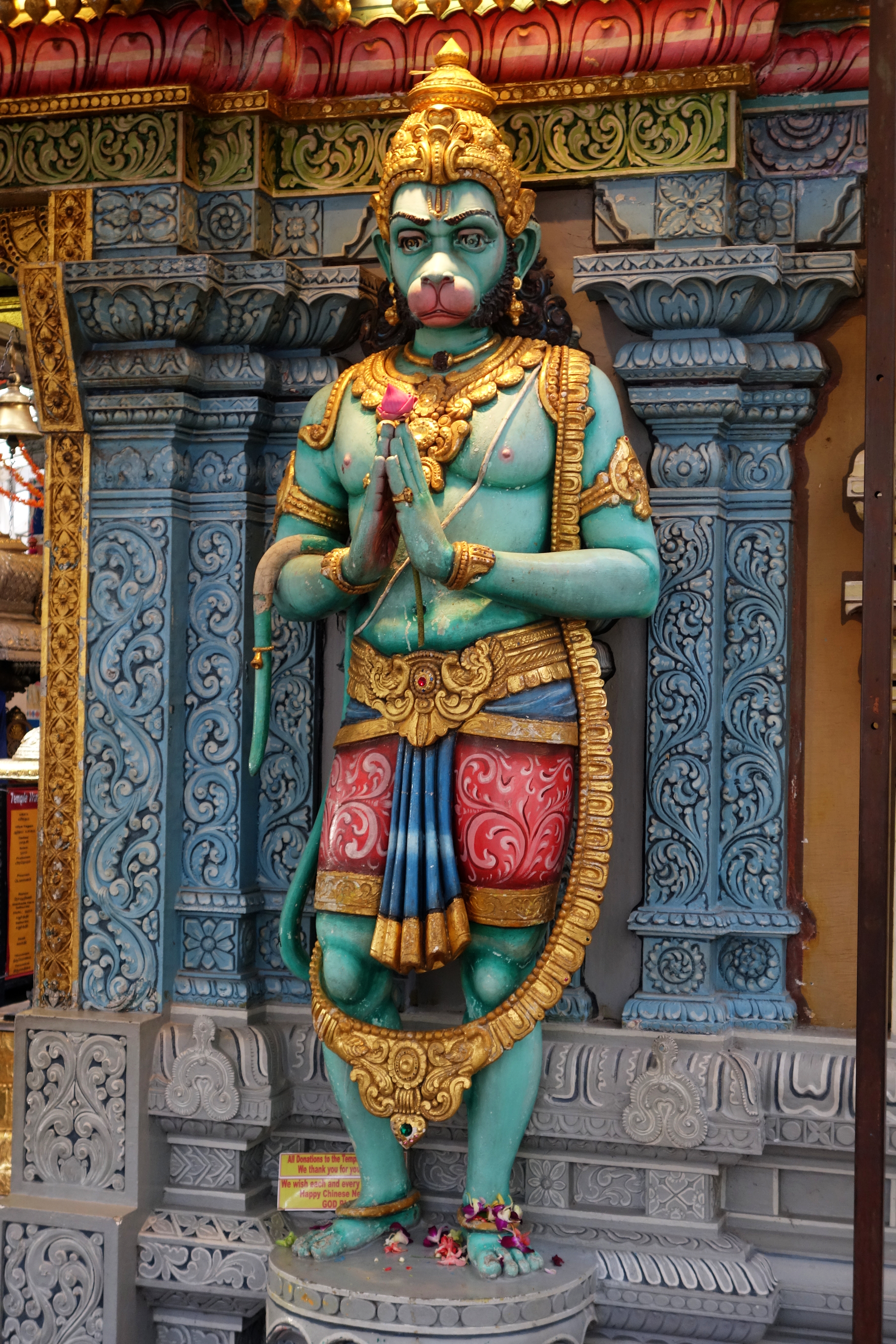|
Sugriva
Sugriva (, ), is a character In the ancient Hindu epic Ramayana. He is the younger brother of Vali (Ramayana), Vali, whom he succeeded as ruler of the vanara kingdom of Kishkindha. He is a son of Surya, the Hindu deity of the sun. As the king of the vanaras, Sugriva aided Rama in his quest to liberate his wife Sita from captivity at the hands of the rakshasa king Ravana. Nomenclature He is also known as , , , , , Creole language, Creole: Soogrim, , , , Sugreeva or Sugreev. Malayalam:Sugreevan. Legend The story of Sugriva is part of Ramayana and in an abbreviated version, is also present in the Mahabharata. The king of Kishkindha, Vrikshraja, was a divine creature born from Brahma's tilaka. He had the body of a human and face and tail of a monkey. He was instructed to roam the forests and kill demons. One day, Vriksharaja entered an enchanted pond, and was transformed into a beautiful lady, attracting the attention of both Indra and Surya. Soon after, they each sired Vali ... [...More Info...] [...Related Items...] OR: [Wikipedia] [Google] [Baidu] |
Tara (Ramayana)
In the Hindu epic ''Ramayana'', Tara (, , ) is the Queen of Kishkindha and the wife of the vanara (monkey) King Vali (Ramayana), Vali. After being widowed, she becomes the Queen of Sugriva, Vali's younger brother. Tara is described as the daughter of the vanara physician Sushena in the ''Ramayana'', and in later sources, as an ''apsara'' (celestial nymph) who rises from the Samudra manthan, churning of the milky ocean. She marries Vali and bears him a son named Angada. After Vali is presumed dead in a battle with a demon, his brother Sugriva becomes king and appropriates Tara; however, Vali returns and regains Tara and exiles his brother, accusing him of treachery. When Sugriva challenges Vali to a duel, Tara wisely advises Vali not to accept because of the former's alliance with Rama—the hero of the ''Ramayana'' and an avatar of the god Vishnu—but Vali does not heed her, and dies from Rama's arrow, shot at the behest of Sugriva. The ''Ramayana'' and its later adaptations e ... [...More Info...] [...Related Items...] OR: [Wikipedia] [Google] [Baidu] |
Vali (Ramayana)
Vali () also known as Bali, was a vanara and the king of Kishkindha in the Hindu epic ''Ramayana''. He was the son of Indra, the husband of Tara (Ramayana), Tara, the elder brother of Sugriva, and the father of Angada through his wife, Tara (Ramayana), Tara. Vali obtained a pendant from his father, Indra, that which allowed him to restore his energy even when nearing death, making him a formidable fighter. He banished his brother Sugriva, who had assumed his throne, believing him to be dead. Sugriva sought the assistance of Rama, an avatar of Vishnu, to intervene in their conflict. During a duel between the brothers, Rama shot Vali in the chest with an arrow. Early life According to the epic, fourteen types of gems or treasures were produced from the Samudra manthan, churning of the ocean during the time of the Kurma avatar. Among these treasures were various apsaras (divine nymphs), one of whom was Tara (Ramayana), Tara. Tara was produced from the churning of the ocean, an ... [...More Info...] [...Related Items...] OR: [Wikipedia] [Google] [Baidu] |
Kishkindha
Kishkindha (, ) is a kingdom of the vanaras in Hinduism. It is ruled by King Sugriva, the younger brother of Vali, in the Sanskrit epic ''Ramayana''. According to the Hindu epic this was the kingdom that Sugriva ruled with the assistance of his counsellor, Hanuman. Kishkindha is identified with the present location of Hampi, the erstwhile royal capital of Vijayanagara Empire. During the Treta Yuga, the whole region was within the dense Dandaka Forest which was founded by King Danda, son of Ikshvaku, and descendant of Vaivasvata Manu in the Satya Yuga, which extended from the Vindhya range to the South Indian peninsula. Thus, this kingdom was considered that of the vanaras. During the Dvapara Yuga, the Pandava Sahadeva is stated to have visited this kingdom in the epic ''Mahabharata'' during his southern military campaign to collect tribute for Yudhishthira's Rajasuya sacrifice. Literature Ramayana The Ramayana has a book that is based in Kishkindha, known as the Kishkindha ... [...More Info...] [...Related Items...] OR: [Wikipedia] [Google] [Baidu] |
Ramayana
The ''Ramayana'' (; ), also known as ''Valmiki Ramayana'', as traditionally attributed to Valmiki, is a smriti text (also described as a Sanskrit literature, Sanskrit Indian epic poetry, epic) from ancient India, one of the two important epics of Hinduism known as the ''Itihasas'', the other being the ''Mahabharata''. The epic narrates the life of Rama, the seventh ''avatar'' of the Hindu deity Vishnu, who is a prince of Ayodhya (Ramayana), Ayodhya in the kingdom of Kosala. The epic follows Exile of Lord Rama, his fourteen-year exile to the forest urged by his father King Dasharatha, on the request of Rama's stepmother Kaikeyi; his travels across the forests in the Indian subcontinent with his wife Sita and brother Lakshmana; the kidnapping of Sita by Ravana, the king of Lanka, that resulted in bloodbath; and Rama's eventual return to Ayodhya (Ramayana), Ayodhya along with Sita to be crowned as a king amidst jubilation and celebration. Scholarly estimates for the earliest stage ... [...More Info...] [...Related Items...] OR: [Wikipedia] [Google] [Baidu] |
Angada
Angada (Sanskrit: अङ्गदः, IAST: Aṅgada) is a legendary vanara in Hinduism. He helps Rama find his wife Sita and fight her abductor, Ravana, in the epic Ramayana. He is the son of Vali (Ramayana), Vali and prince of Kishkindha, and is later crowned as the kingdom's monarch. Legend Angada is a son of the powerful vanara king Vali (Ramayana), Bali and his wife Tara. He is the nephew of Sugriva. After Rama and Sugriva kill his father, Angada joins Rama's forces to rescue mata Sita from Ravana's captivity. Angada and Rama are instrumental in reconciling Rama and his brother, Lakshmana, with Sugriva, after the king fails to fulfill his promise to help Rama find and rescue his wife. Together, they are able to convince Sugriva to honour his pledge to Rama, instead of spending his time carousing and drinking. Sugriva then arranges for ''vanaras'' to help Rama and organises the monkey army that will battle Ravana's demonic host. Angada leads the particular search party, ... [...More Info...] [...Related Items...] OR: [Wikipedia] [Google] [Baidu] |
Rumā
Rumā () is a vanara also known as Tara and as the queen of Kishkindha mentioned in the epic ''Ramayana''. She is the wife of King Sugrīva, who ruled over the vanara kingdom of Kishkindha. Legend Ruma is mentioned in Book IV (Kishkindha Kanda) of Ramayana. Sugriva fell in love with her. But Ruma's father did not approve. Hence, Sugriva with the help of Hanuman, abducted Ruma and they married each other. Ruma was taken away from Sugriva by Vāli following the strife of two royal Vānara brothers. Later, the fact of Rumā being withheld by Vāli became the primary justification for Rama Rama (; , , ) is a major deity in Hinduism. He is worshipped as the seventh and one of the most popular avatars of Vishnu. In Rama-centric Hindu traditions, he is considered the Supreme Being. Also considered as the ideal man (''maryāda' ...'s slaying Vāli and helping Sugrīva to become the sovereign of Kishkindha. When accused by Vāli of lowly, treacherous, and unexpected a ... [...More Info...] [...Related Items...] OR: [Wikipedia] [Google] [Baidu] |
Vanaras
In Hinduism, Vanara () are either monkeys, apes, or a race of forest-dwelling people. In the epic the ''Ramayana'', the Vanaras help Rama defeat Ravana. They are generally depicted as humanoid apes, or human-like beings. Etymology There are three main theories about the etymology of the word "Vanara": * Aiyanar suggests that ''vanara'' means "monkey" derived from the word ''vana'' ("forest"), Literally meaning "belonging to the forest" Monier-Williams says it is probably derived from ''vanar'' (lit. "wandering in the forest") and means "forest-animal" or monkey. * Devdutt Pattanaik suggests that it derives from the words ''vana'' ("forest"), and ''nara'' ("man"), thus meaning "forest man" and suggests that they may not be monkeys, which is the general meaning. * It may be derived from the words ''vav'' and ''nara'', meaning "is it a man?" (meaning "monkey") or "perhaps he is man". Identification Although the word Vanara has come to mean "monkey" over the years and th ... [...More Info...] [...Related Items...] OR: [Wikipedia] [Google] [Baidu] |
Hanuman
Hanuman (; , ), also known as Maruti, Bajrangabali, and Anjaneya, is a deity in Hinduism, revered as a divine ''vanara'', and a devoted companion of the deity Rama. Central to the ''Ramayana'', Hanuman is celebrated for his unwavering devotion to Rama and is considered a '' chiranjivi''. He is traditionally believed to be the spiritual offspring of the wind deity Vayu, who is said to have played a significant role in his birth. In Shaiva tradition, he is regarded to be an incarnation of Shiva, while in most of the Vaishnava traditions he is the son and incarnation of Vayu. His tales are recounted not only in the ''Ramayana'' but also in the '' Mahabharata'' and various ''Puranas''. Devotional practices centered around Hanuman were not prominent in these texts or in early archaeological evidence. His theological significance and the cultivation of a devoted following emerged roughly a millennium after the ''Ramayana'' was composed, during the second millennium CE.Paula Richman ... [...More Info...] [...Related Items...] OR: [Wikipedia] [Google] [Baidu] |
Vanara
In Hinduism, Vanara () are either monkeys, apes, or a race of forest-dwelling people. In the epic the ''Ramayana'', the Vanaras help Rama defeat Ravana. They are generally depicted as humanoid apes, or human-like beings. Etymology There are three main theories about the etymology of the word "Vanara": * Aiyanar suggests that ''vanara'' means "monkey" derived from the word ''vana'' ("forest"), Literally meaning "belonging to the forest" Monier-Williams says it is probably derived from ''vanar'' (lit. "wandering in the forest") and means "forest-animal" or monkey. * Devdutt Pattanaik suggests that it derives from the words ''vana'' ("forest"), and ''nara'' ("man"), thus meaning "forest man" and suggests that they may not be monkeys, which is the general meaning. * It may be derived from the words ''vav'' and ''nara'', meaning "is it a man?" (meaning "monkey") or "perhaps he is man". Identification Although the word Vanara has come to mean "monkey" over the years and th ... [...More Info...] [...Related Items...] OR: [Wikipedia] [Google] [Baidu] |
Rama And Lakshmana Meet Sugriva At Matanga’s Hermitage
Rama (; , , ) is a major deity in Hinduism. He is worshipped as the seventh and one of the most popular avatars of Vishnu. In Rama-centric Hindu traditions, he is considered the Supreme Being. Also considered as the ideal man (''maryāda'' ''puruṣottama''), Rama is the male protagonist of the Hindu epic ''Ramayana''. His birth is celebrated every year on Rama Navami, which falls on the ninth day of the bright half (Shukla Paksha) of the lunar cycle of Chaitra (March–April), the first month in the Hindu calendar. According to the ''Ramayana'', Rama was born to Dasaratha and his first wife Kausalya in Ayodhya, the capital of the Kingdom of Kosala. His siblings included Lakshmana, Bharata, and Shatrughna. He married Sita. Born in a royal family, Rama's life is described in the Hindu texts as one challenged by unexpected changes, such as an exile into impoverished and difficult circumstances, and challenges of ethical questions and moral dilemmas. The most notable story ... [...More Info...] [...Related Items...] OR: [Wikipedia] [Google] [Baidu] |
Rama Meets Sugreeva
Rama (; , , ) is a major deity in Hinduism. He is worshipped as the seventh and one of the most popular avatars of Vishnu. In Ramanandi Sampradaya, Rama-centric Hindu traditions, he is considered the Supreme Being. Also considered as the ideal man (''maryāda'' ''puruṣottama''), Rama is the male protagonist of the Hindu epic ''Ramayana''. His birth is celebrated every year on Rama Navami, which falls on the ninth day of the bright half (Paksha, Shukla Paksha) of the lunar cycle of Chaitra (March–April), the first month in the Hindu calendar. According to the ''Ramayana'', Rama was born to Dasharatha, Dasaratha and his first wife Kausalya in Ayodhya (Ramayana), Ayodhya, the capital of the Kingdom of Kosala. His siblings included Lakshmana, Bharata (Ramayana), Bharata, and Shatrughna. He married Sita. Born in a royal family, Rama's life is described in the Hindu texts as one challenged by unexpected changes, such as an exile into impoverished and difficult circumstances, ... [...More Info...] [...Related Items...] OR: [Wikipedia] [Google] [Baidu] |








